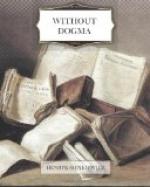I brought with me into the world very sensitive nerves, nerves perfected by the culture of generations. During the first years of my childhood I remained under the care of my aunt; after her departure, according to the custom of our country, a nursery governess was engaged for me. As we lived in Rome, among foreign surroundings, and my father wished me to be well grounded in my own language, he engaged a Polish governess. She is still with us as housekeeper at Babuino. My father also bestowed some pains upon me, especially after my fifth year. I used to go to his room to talk with him, and this developed my mind prodigiously, too much so perhaps for my age. Later on, when his studies and archaeologic researches took up his whole time, he engaged a tutor, Father Calvi. This was an old man, with a mind and faith exceedingly serene. He loved art beyond everything. I believe religion even reacted upon him through its beauty. In the galleries before the old masters, or listening to the music in the Sistine Chapel, he lost himself altogether. There was nothing pagan in these feelings, as they were not based upon sybaritism or sensual enjoyment. Father Calvi loved art with the pure, serene feeling as maybe a Da Fiesole, a Cimabue, or Giotto loved it. And he loved in all humility, as he himself had no gifts that way. I could not say which of the fine arts he loved best, but I believe he leaned mostly towards harmony, which responded to the harmony of his own mind.
Whenever I think of Father Calvi, I am reminded at the same time of the old man that stands beside Raphael’s Saint Cecilia listening intently to the music of the spheres.
Between my father and the priest sprang up a friendship which lasted unto the latter’s death. It was he who confirmed my father in his archaeologic researches, especially about Rome. There was another bond between these two,—their love for me. Both considered me as an exceptionally gifted child, and of a God knows what promising future. It strikes me at times that I formed for them a kind of harmony,—a rounding of and completion to the world in which they lived; and they loved me with the same absorbing passion with which they loved Rome and its antiquities. Such an atmosphere, such surroundings, could not fail to impress my mind. I was brought up in an original way. With my tutor,—sometimes with my father,—I visited galleries, museums, villas, ruins, catacombs, and the environs of Rome. Father Calvi was equally sensitive to the beauties of nature and to those of art, and taught me at an early age to understand poetic melancholy. The Roman Campagna, the harmony of the arch-line on the sky of the arches in the ruined aqueducts, the fine tracery of the pines,—I understood all this before I could read or had mastered the first rudiments of arithmetic. I was able to set English tourists right to whom the names of Carracci and Caravaggio caused confusion. I learned Latin early and without effort, from being familiar




